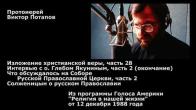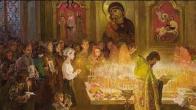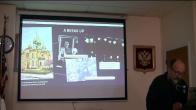You are here
Thou shalt not take the name of the Lord thy God in vain
Thou shalt not take the name of the Lord thy God in vain.
This commandment forbids us to pronounce the holy Name of God without reverence, and forbids any trivial mention of God in superficial conversation.
The Third Commandment safeguards prayer, which is the basis of our communion with God. By His Word, God created the world. Then the Word of God became incarnate to save the world. Therefore, our own word in prayer also (insofar as we are the image of God) has great power. We must pronounce each word carefully, especially the Name of God, which was revealed to us by God Himself. We may use it only for prayer, for blessing, and for teaching the truth. Saying the Name of God in vain disaccustoms us to using It properly, and we weaken our own ability for communion with God.
The Third Commandment relates also to swearing oaths. Jesus Christ warns us against swearing oaths: But I say unto you, Swear not at all; neither by heaven; for it is God's throne: nor by the earth; for it is his footstool . . . . (Matthew 5:34-35).
Some sectarians point to these words of Jesus Christ as a prohibition against swearing oaths altogether. But we know of instances in the Old and New Testaments when oaths were pronounced. Thus, in the Epistle of the Apostle Paul to the Hebrews we read: Wherein God, willing more abundantly to shew unto the heirs of promise the immutability of his counsel, confirmed it by an oath (Hebrews 6:17). In the Apocalypse, we read that the Angel swore by him that liveth for ever and ever (Revelation 10:6). The Apostle Paul more than once said: For God is my record, how greatly I long after you all in the bowels of Jesus Christ (Philippians 1:8).
The question might be raised: On what grounds and in what sense did Jesus Christ forbid swearing any oaths? The fifth chapter of the Gospel according to Matthew--where the prohibition of swearing oaths by Christ is spoken of--relates how the Savior disclosed his sublime reinterpretation of the Ten Commandments given on Sinai. He made a series of comparisons between the ancient strict applications of the Law and His own gentle commentary. The Lord contrasted murder with wrongful anger, adultery with impure gazing, false oaths with the rejection of all oaths. All His concerns were in the state of a man's soul in his personal affairs. The oaths presented earlier here were impersonal and related to the general affairs of mankind, to the destiny of God's truth, and the fulfilling of God's Word--things important for the whole race of man.
This distinction in the grounds for swearing oaths allowed the introduction of oaths into Christian society, such as swearing by the Name of God to confirm promises or testimony in matters social, legal, or governmental. Oaths in the army merged each soldier's loyalty, which was common to all and founded on faith in God. The oath of a witness in court declares that his testimony will not contradict the truth.
On the other hand, reviling God, murmuring against God, blasphemy, and swearing are harmful. Each evil or false word is destructive. Such words can destroy friendship, family, and nation.
Concerning the necessity to bridle the tongue, the Apostle James writes with particular power in the third chapter (verses 2-12) of his Epistle:
If a man offend not in word, the same is a perfect man, and able also to bridle the whole body. Behold, we put bits in the horses' mouths, that they may obey us; and we turn about their whole body. Behold also the ships, which though they be so great, and are driven of fierce winds, yet are they turned about with a very small helm, whithersoever the governor listeth. Even so the tongue is a little member, and boasteth great things.
Behold, how great a matter a little fire kindleth! And the tongue is a fire, a world of iniquity: so is the tongue among our members, that it defileth the whole body, and setteth on fire the course of nature; and it is set on fire of hell. For every kind of beasts, and of birds, and of serpents, and of things in the sea, is tamed, and hath been tamed of mankind: but the tongue can not man tame; it is an unruly evil, full of deadly poison.
Therewith bless we God, even the Father; and therewith curse we men, which are made after the similitude of God. Out of the same mouth proceedeth blessing and cursing. My brethren, these things ought not so to be. Doth a fountain send forth at the same place sweet water and bitter? Can the fig tree, my brethren, bear olive berries? either a vine, figs? so can no fountain both yield salt water and fresh (James 3:2-12).
If God and His Word is Truth Itself and Life, then the devil and his word are falsehood and the source of death. The Lord said that the devil was a murderer from the beginning . . . . a liar, and the father of lies (John 8:44).
For many decades in the Soviet Union the word God was written entirely in lower-case letters to diminish the significance of our Lord. In all countries of the world, when referring to the One God of monotheism, one writes the word God using an initial capital letter to differentiate God from the word god of polytheism. Even in reprints of the classics of Russian literature, for 70 years the capital letter of this great word was expunged. Fortunately, the situation has begun to improve. Often one can now find in Soviet print the great word God written with an initial capital letter. Of course, a reverent attitude towards our Creator requires the use of this capital letter.
In the 18th century, Saint Tikhon of Zadonsk wrote:
"Pronounce the Name of God and make mention of It with total respect, fear, and reverence and only then and there, when and where it is necessary; for the Name of God is holy and fearsome and anyone mentioning it disrespectfully sins gravely. And so, give respect to God's Name as unto God Himself. "
It is proper to mention or pronounce the Name of God in prayer, in glorification, in thanksgiving, in spiritual hymns of praise and in discussions and conversations appropriate for Christians; that is, when the conversation is about God's holy word, about the Law and the Gospel, about the advent of Christ into the world, about His sufferings and death that were offered for our sake, about death, about eternal torment and eternal life, and so forth. In other conversations do not make mention of the Name of God without extreme necessity, and if it is necessary to mention It, do so with all heedfulness and due respect.
Swearing has become habitual--something extremely indecent for Christians. Expressions such as by God, God is my witness, God knows, are used by people too often. Such swearing is a satanic invention to dishonor God's Name and to damn oneself. Take care not to swear, using these and similar expressions. When it is necessary to affirm the truth, let the words of Christ serve you: Yea, yea; Nay, nay (Matthew 5:37). Anything more is from the Evil One.
©Archpriest Victor Potapov
1991-1992
Relics in cathedral - monthly calendar
| S | M | T | W | T | F | S |
|---|---|---|---|---|---|---|
|
|
1
|
2
|
3
|
4
|
5
|
6
|
|
7
|
8
|
9
|
10
|
11
|
12
|
13
|
|
14
|
15
|
16
|
17
|
18
|
19
|
20
|
|
21
|
22
|
23
|
24
|
25
|
26
|
27
|
|
28
|
29
|
30
|
|
|
|
|
PARISH LIFE
RECENT VIDEOS
Address of our Cathedral
Subscribe to our mailing list
While all the materials on this site are copyrighted, you may use them freely as long as you treat them
with respect and provide attribution on the Russian Orthodox Cathedral of St.John the Baptist of Washington DC.









